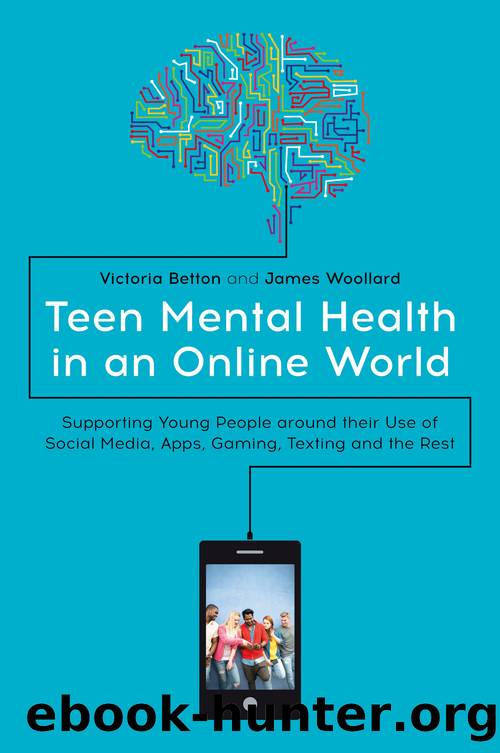Teen Mental Health in an Online World by Victoria Betton

Author:Victoria Betton
Language: eng
Format: epub
ISBN: 9781784508524
Publisher: Jessica Kingsley Publishers
Published: 2018-08-22T16:00:00+00:00
Excessive use of the internet
Concern that the internet is inherently antisocial and that young people are engaging with their phones in preference to in-person relationships is familiar trope within popular discourse. However, this dominant view is inconsistent with evidence from research, which finds that young people primarily use digital technologies to extend their interactions with friends from school and other face-to-face social settings, or to engage with traditional media such as music and film (Common Sense, 2016).
A UNICEF research project noted that child participants often expressed nostalgic views about a time when face-to-face relationships were the norm, even though this could not reflect their own lived experience which does not precede the existence of the internet. The authors argue that this nostalgia for a time that young people cannot have personally experienced suggests that it has been imposed by the adult world rather than necessarily being grounded in young people’s lives (Third et al., 2014).
The notion of internet addiction has taken a firm grip on public consciousness and the effects of problematic internet use are regularly scrutinised in the media. Take for example, an article in The Atlantic entitled: ‘Have smartphones destroyed a generation?’ (Twenge, 2017) which posits that smartphone use is precipitating a mental health crisis in teens. However, there is ambiguity about what constitutes internet addiction, given that smart devices can be used for many different activities from watching videos through to playing games and chatting with friends. Focusing simply on time spent online is problematic when so many activities can take place via the internet (Common Sense, 2016). The fifth edition of the American Diagnostic and Statistical Manual of Mental Disorders (DSM-5) does not include a diagnostic category of internet addiction, but does include a new category of Internet Gaming Disorder (IGD). In the 11th revision of the International Classification of Diseases (ICD-11), the World Health Organisation has classified digital and video gaming as a mental health disorder (WHO, 2018). However there remains controversy both about the diagnostic category itself and the associated symptoms (Common Sense, 2016). The term Problematic Interactive Media Use among Children and Adolescents (PIMU) has entered the lexicon in this field and there is an increasing number of academic studies exploring this topic area.
An international OECD study found that most teens are balanced in their use of the internet and generally report beneficial effects from being online (OECD, 2017). Zahid’s reflections exemplify a sensible approach to achieving on/offline balance:
Yes, I would say that the internet is good for so many purposes for different people, it depends on everyone and what the internet brings to their lives, you know, but it’s just maybe over using it for maybe some people, who maybe use it for unnecessary stuff and that is not really, really important. That doesn’t help other people as well. So I think if you use the internet for a better purpose, it will bring a positive thing to you. But if you use it for a negative purpose, then, obviously, it doesn’t help.
Download
This site does not store any files on its server. We only index and link to content provided by other sites. Please contact the content providers to delete copyright contents if any and email us, we'll remove relevant links or contents immediately.
Systems of Psychotherapy by James O. Prochaska and John C. Norcross(765)
The Expanded Dialectical Behavior Therapy Skills Training Manual by Lane Pederson(652)
The Mentoring Manual by Julie Starr(646)
Values in Therapy by Jenna LeJeune(597)
Emotionally Focused Couple Therapy For Dummies by Brent Bradley(594)
Transformation through Intimacy, Revised Edition by Robert Augustus Masters Ph.D(570)
The Gaslighting Recovery Workbook: Healing From Emotional Abuse by Amy Marlow-MaCoy LPC(561)
The Polyvagal Theory in Therapy by Deb Dana(556)
After the Affair, Updated Second Edition by Janis A. Spring(556)
The Grieving Child by Helen Fitzgerald(542)
Sadomasochism by Kleinplatz Peggy J. Moser Charles(505)
Research Methods for Counseling by robert j. wright(494)
Why Isn't This Marriage Enough by sharon pope(486)
The Mediator's Toolkit by Gerry O'Sullivan(468)
The STOP Domestic Violence Program by David B. Wexler(458)
Safe Haven Marriage by Archibald Hart Sharon Morris(450)
29:16:04:59 by Joshua Johnson(440)
THE HUSBANDS AND WIVES CLUB by LAURIE ABRAHAM(440)
Marriage and Lasting Relationships with Asperger's Syndrome by Eva A. Mendes(430)
